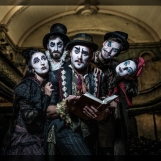Teaching Theatre and Performance Histories Mini-Conference 20-21 March 2024, University of Warwick
Deadline: Friday 15 December 2023
Nearly twenty years ago, Anne Fliotsos and Gail Medford remarked on the lack of attention our discipline pays to teaching: “it is one of the great ironies of theatre scholarship that what most of us do, few of us study” (1). Much has changed in the decades since, from the kinds of students that we teach to the ways that they learn. Scholars have begun to take pedagogy more seriously, publishing essays on how to teach musical, queer, and global-majority theatre and performance histories, for example (2). Nevertheless, we have few opportunities to come together and talk about our teaching. This mini-conference aims to provide an occasion for sharing and reflecting on how we teach theatre and performance histories today. We invite 15-minute papers that respond to any aspect of this CfP from scholars and educators who teach any period of theatre and performance history. We’re especially open to alternative formats ranging from 5-minute provocations to 30-minute teaching demonstrations. As an output from this event, we’re considering developing the papers from this mini-conference into an edited collection. Presentations might (but should not be limited to) addressing one or more of the following questions in relation to teaching theatre and performance histories:
- What does research-led teaching look like for us?
- How are we teaching dramatic literature in innovative ways?
- How are we decolonizing our curricula?
- How do we use practice in our teaching?
- What sorts of diverse assessment methods are we using?
- Are we using gamification to engage our students?
- How are we embedding skills development in our modules?
- What are the modules that we teach that work well?
- What best practices can we share for working with challenging materials?
- Did covid-19 provide new opportunities for approaches to teaching?
- How are we incorporating digital technologies in our teaching?
- In what ways is seeing live theatre engaging our students in histories?
- Do field trips enhance our practices?
Please note: only one proposal may be submitted for a TaPRA event. It is not permitted to submit multiple proposals or submit the same proposal to several Calls for Participation. All presenters must be TaPRA members, i.e. registered for the event; this includes presentations given by Skype or other media broadcast even where the presenter may not physically attend the event venue.

